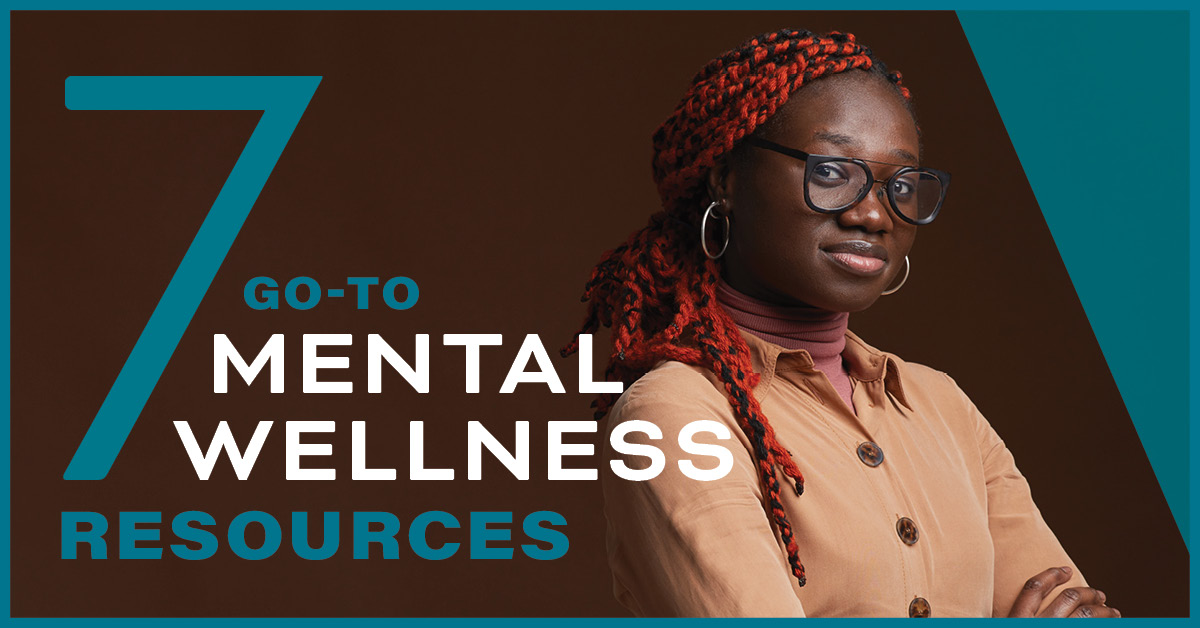Mental health is one of my 5 Pillars of Health and Wellness©. As a family medicine doctor, I believe that mental health is just as important as our medical, physical, aesthetic and spiritual health.
Like any topic, there is an endless stream of information online about mental health and wellness. It can be overwhelming to know where to begin. It’s also important to know you are getting accurate information. That’s why I have put together a list of mental wellness resources from sources that I know and trust. I hope you find them helpful as you research this important topic.
Diet and Depression
Diet is such an important component of mental health that there is an entire field of medicine dedicated to it: nutritional psychiatry. The bottom line – what we eat affects every area of our health, especially our mental health. This is supported by recent research linking what you eat and your risk of depression. Plants like fruits and veggies, unprocessed whole grains, seeds and nuts, and lean proteins help decrease the risk of depression. On the flip side, foods like sugars, flours, animal fats, processed meats and butter are shown to increase the risk of depression. Learn more
The Brain-Gut Connection
Did you know that your gut is considered a “second brain”? In fact, the “brain in the gut” is completely changing the medical field’s understanding of the links between digestion and health – including mental health. This “second brain” is officially called the enteric nervous system (ENS) and its primary job is controlling digestion. It also communicates back and forth with the brain. Researchers are finding that irritation in the G.I. system can cause the ENS to send signals to the brain that trigger mood changes, including depression and anxiety. This new understanding is leading to new treatments, such as antidepressants and mind-body therapies, for “gut” issues like IBS and bowel disorders. One researcher explains that doctors “are like counselors looking for ways to soothe the second brain.” Learn more
The Brain-Gut Microbiome Axis
Studies have clearly shown the interaction between the gut and the brain. Gut microbes communicate to the central nervous system, and the brain can affect the gut through the autonomic nervous system, creating a circular communication loop. Any disturbance in the communication loop can cause dysregulation, which has been linked to irritable bowel syndrome, obesity, and several psychiatric and neurologic disorders. Ongoing research will hopefully help us understand the causes and identify the most effective treatments for some of the nation’s most debilitating, costly and poorly understood diseases. Learn more
Depression and Sleep: What’s the Connection?
Depression and sleep issues may go hand-in-hand. More than 75% of people with depression have some form of sleep disorder, such as sleep apnea or insomnia. Depression symptoms can affect your sleep, and symptoms of sleep disorders may also lead to depression. The best course of treatment will depend on if your depression is causing sleep-related symptoms, or if your sleep disorder is resulting in depression. Treatment options may include medications, therapy, white light exposure, supplements, machine use or surgical procedures. Lifestyle changes, including diet and exercise, can also have a positive effect. Learn more
Depression and Anxiety: Exercise Eases Symptoms
If you’re feeling down, exercise is probably the last thing you want to do. But research shows that exercise can improve mood and reduce anxiety. It can also help keep depression and anxiety from returning. Exercise does this by releasing “feel-good” endorphins and distracting your mind from negative thoughts. Traditional exercise includes things like running, biking, lifting weights and playing basketball. Physical activities like gardening, washing the car, cleaning the house or walking the dog can also help. Exercising a minimum of 30 minutes a day, three to five days a week, can significantly improve depression or anxiety symptoms, but if you only have 10 to 15 minutes at a time, that may still help. Just be sure to pick activities that you enjoy as the mental health benefits may only last if you stick with it. Learn more
Depression and Anxiety Disorders: Benefits of Exercise, Yoga and Meditation
Many people with depression or anxiety want treatment options other than medication, such as exercise, yoga, tai chi, qi gong and meditation. Reviews have shown that these activities can improve symptoms of depression and anxiety. Exercise seems most helpful for some types of depression, as well as post-traumatic stress disorder. Yoga shows positive effects for depression and can help with anxiety, particularly panic disorder. Tai chi and qi gong may be helpful for depression, although effects are inconsistent. The positive effects of mindfulness-based meditation on depression can last for six months or more. No negative side effects have been seen with these mindfulness-based treatments, and their benefits support the use for patients with depression and anxiety. Learn more
The 7 Best Vitamins and Supplements for Stress
Stress is a fact of life for most people. It can be acute or chronic, and can lead to symptoms like fatigue, headaches, upset stomach, nervousness, irritability or anger. We’ve all heard that exercise, sleep and a good diet can help manage stress, but did you know vitamins and supplements can also be a stress-busting tool? Learn more
As always, if you or someone you love are struggling with mental health, and are looking for a health care provider who can help you understand what is causing it and the most effective, holistic way to treat it, please get in touch.

